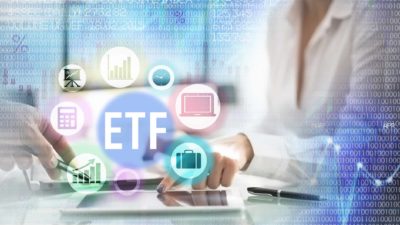I don't normally buy exchange-traded funds (ETFs), but I would invest in the two I'm going to tell you about in this article.
ETFs are a great way to invest if you're not sure about individual businesses during this difficult COVID-19 period. Over the long-term shares have a habit of rising in value as their earnings grow. So if you're invested in many good businesses then as a group they'll hopefully do quite well.
These are two ETFs I'd buy for my portfolio:
BetaShares Global Quality Leaders ETF (ASX: QLTY)
As the name suggests, this ETF is focused on quality. Quality can mean different things to different people. It could mean how reliable its earnings are. It could mean how fast the business is growing. Maybe quality refers to its profit margins.
The shares that make as holdings of this ETF rank highly on four attributes: return on equity (ROE), debt to capital, cashflow generation ability and earnings stability. I think if a business ranks well on all of those factors then it would count as high quality.
I think it's fair to say that the businesses which have reliable earnings, good cashflow and manageable (or no) debt would be able to perform better than average during COVID-19. During better economic times these businesses may be able to generate better growth as well – leading to potential outperformance of the global share indices.
The ETF owns 150 shares from different regions and different sectors. Its top holdings are: Apple, Nvidia, Accenture, Adobe, Intuitive Surgical, Facebook, Intuit, L'Oreal, Cisco Systems and Unitedhealth.
It is invested in various industries but around 60% of it is invested in IT and healthcare businesses. These two sectors are capable of producing growth even if the economy isn't firing on all cylinders.
The ETF was only launched by BetaShares in November 2018. Since then it has returned an average of 19.76% per annum. Past performance is not a guarantee of future performance, but it shows the types of returns that the underlying businesses can generate.
BetaShares NASDAQ 100 ETF (ASX: NDQ)
Many of the best businesses in the world aren't listed on the ASX. Many of them are actually listed on the NASDAQ, a stock exchange in the US.
The biggest technology businesses have changed the way we (and others around the world) live and are now heavily integrated into society. Apple, Amazon, Facebook, Alphabet (Google), Microsoft and so on – they all feature as major holdings within the ETF.
Look a bit further down the ETF's holdings list and you'll find more exciting technology growth shares like Tesla, Nvidia, Paypal, Netflix, Adobe, Intel and Broadcom.
COVID-19 is impacting many industries but technology seems to be one of the least affected sectors. Many businesses deliver their service digitally, so they're not really susceptible to social distancing rules.
The reason why they're not vulnerable to COVID-19 impacts is also one of the main reasons why they're so profitable. Software can be replicated for virtually no extra costs after the initial development. The FAANG shares have very attractive gross profit margins.
The BetaShares NASDAQ 100 ETF has been a very strong performer over the short-term and long-term. Over the past year the ETF's net return, after fees, was 35.5% to 30 June 2020. Over the past five years it has returned an average of 20.75% per annum.
Again, past performance doesn't guarantee future returns. But the FAANG shares keep performing and as long as regulation doesn't undo them then I think they can keep growing earnings impressively during the 2020s.
Foolish takeaway
I think both of these ETFs can produce long-term returns. At the current prices I'd probably go for the BetaShares quality ETF. The NASDAQ ETF is running hot recently and I think the US election could cause volatility for US shares.







